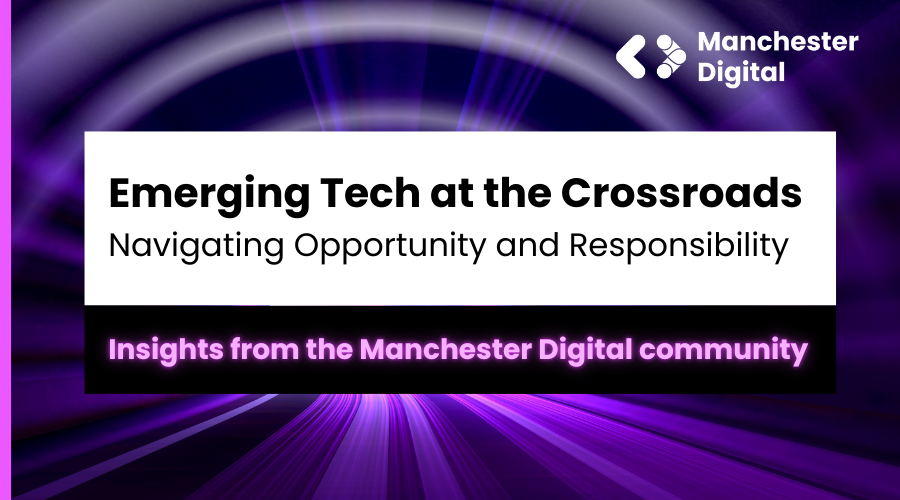
At MD Future Live 25, Manchester Digital brought the community together to explore the latest trends in emerging technology.
From AI and quantum computing to sustainable infrastructure, immersive interfaces and accessible tech, it’s clear that innovation is reshaping industries at pace.
In this post, we share insights from our members on how to navigate the opportunities and responsibilities that come with this next wave of transformation.
MD Future Live was delivered in partnership with:
Robiquity
Are we making ourselves redundant?
Elaine Higgins, Chief People Officer
The rise of AI – a topic dominating both social and traditional media sources. The core questions central to this debate seem to be:
- Does the convenience of having access to this intelligence come at a cost?
- Are we dumbing down our society for an instant and at times, incorrect answer?
- ·What is a technical career when the technology can write itself?
On a classic change curve cycle, the UK seems to be frozen between frustration and depression when we search for answers to these questions.
However, there is light at the end of the tunnel. At Robiquity we are witnessing our most forward-thinking clients leap into experimentation and AI application which is providing a competitive advantage and creating a healthier workforce. But how?
Businesses are creating simple applications that streamline complex processes and ensure customer and employee experiences are impactful. By creating meaningful problem statements and use cases, technology continues to provide enablers that make complex organisational blockers much simpler. This creates a new level of efficiency and ingenuity in our workforce where we witness a move towards more creative and personalised technology solutions.
Technology continues to evolve to create competitive advantage as opposed to individual threats.
Find out more about Robiquity here.
BDO
At the crossroads of innovation and ethics
Emerging technologies are reshaping industries at speed. They offer huge commercial and creative opportunity, but come with ethical and practical challenges we can’t ignore.
Early adopters of technologies such as generative AI and spatial analytics can gain competitive edge through faster innovation, automation, and personalisation. However barriers remain such as legacy systems, regulatory uncertainty, skills gaps and justified concerns over privacy, bias and trust. We are seeing that creativity is evolving too. AI doesn’t replace it, but reshapes it, making human input more about curation, judgement and intent.
We also face difficult ethical questions, for example how do we ensure fairness in automated decisions? Who is accountable for machine-made mistakes? And how do we avoid deepening inequality through inaccessible or unsustainable tech?
The future must be designed with responsibility in mind. At BDO, we’re helping clients embrace innovation while embedding trust, sustainability and value creation into their digital strategies.
We are at a critical crossroads: one that requires balancing pace with principle. The technologies we adopt today will shape not just markets, but the society we live in tomorrow.
Find out more about BDO here.
Slalom
Building AI on ethical foundations
James Pimlott, Senior Principal in Data & Technology
Throughout history we have seen waves of technological advancement; be it the post war Industrial Revolution enabling companies to scale manufacturing outputs at unprecedented rates, to mass adoption of the internet creating true global connectivity and access to global markets. It is safe to say that we are at the start of what is likely going to be the most revolutionary technological evolution that humanity has ever seen, with AI set to transform the way every single person lives their life in some respect. This new technology however, brings us to a crossroad where we must navigate the gravity of this opportunity alongside ethical considerations in equal measure.
Ethical issues from privacy, bias in algorithms to anxieties about automation and job displacement highlight that progress must be thoughtful and human-centric. Leaders are also beginning to embed accessibility and sustainability into AI design, recognising AI’s power to expand opportunities for people with disabilities when built inclusively - and let’s not forget the environmental considerations associated with AI’s large energy footprint.
As this evolution takes hold, businesses should prioritise data foundations, including data ethics, build and deploy AI only on data gathered with clear, ongoing consent, preserved with good quality data, accountability, and governed so people can see, contest, and withdraw its use - because trustworthy outcomes begin with respecting the humans inside the data.
Find out more about Slalom here.
Galvia
How Manchester’s retailers can overcome uncertainty and adopt AI
Artificial intelligence is no longer a distant prospect. It’s reshaping operations across industries right now. Yet for many small and medium-sized retail enterprises, there is still hesitancy around adoption.
Leaders recognise AI’s potential to improve business performance, but often worry about costs, complexity, data readiness, and whether it will deliver meaningful value.
Five challenges emerge time and again, but they can all be overcome:
- Perceived complexity and cost – Building AI into processes and operations can seem reserved for global giants, but smaller organisations can achieve impact using existing data and the right tools.
- Delayed returns – AI implementation is often viewed as a major, lengthy project, with years to see ROI. But quick integration with current systems can produce early wins that build momentum.
- Fragmented data – This slows decisions across businesses and can unnecessarily hinder AI adoption. A single source of truth aligns teams, enabling faster, better-informed choices.
- Unclear priorities – Without clarity on which problems AI can help to tackle first, progress stalls. Structured programmes like our AI Adoption Accelerator allow you to see how AI works and the impact it can have on your business, before you invest.
- Fear of large-scale change – AI can start small, solving one challenge at a time.
Manchester’s strength lies in collaboration and practical innovation. By viewing AI adoption as a series of manageable, supported steps, businesses can unlock its potential now.
Find out more about Galvia here.
UrbanChain
How can we embed accessibility and sustainability into emerging tech
Dr. Somayeh Taheri, CEO and Co-Founder
For UrbanChain, accessibility and sustainability aren’t add-ons, they’re the foundation of our technology. Our AI-driven distributed operating system is built to make renewable energy markets work for everyone. They are driven by the terms that works for different size and types of renewable assets and energy users. By removing the complexity of traditional energy procurement and replacing it with transparent, user-friendly tools, we lower the barriers to participation and ensure that the clean energy transition is inclusive as possible.
On the sustainability side, our algorithms optimise renewable energy usage, aligning consumption with periods of peak generation in half-hourly increments. This minimises reliance on fossil fuels, reduces carbon emissions, and cuts costs for consumers. We also design for scalability, ensuring our systems can integrate new renewable sources and adapt to shifting demand patterns without creating new environmental burdens.
Accessibility means more than interface design – it’s about equitable access to the benefits of emerging tech. That’s why we prioritise awareness, transparency, and affordability. Sustainability means more than emissions reduction – it’s about long-term viability for both people and planet. In merging these principles, UrbanChain ensures that the tech we develop today will still serve communities, markets, and ecosystems tomorrow.
Find out more about UrbanChain here.
Leighton
AI at scale: unlocking practical business benefits
Lee Gilmore, AWS Practice Lead
The advent of AI in recent years has been astronomical, but behind the buzzwords AI is offering businesses tangible, transformative opportunities. The growing accessibility of AI means there is real potential for organisations to modernise applications and embed AI into their products. Whether they’re looking to use AI-driven automation to carry out routine tasks, optimise workflows and improve scalability or to use the technology to improve customer experience, for example through AI-recommended products, the practical application of AI is offering businesses the chance to take advantage of what could be a core driver of efficiency and growth.
In addition, when paired with serverless technologies and containerisation, particularly on platforms like AWS, AI can bolster most solutions, making them more cost effective and sustainable. By eliminating the need for always-on servers and providing ways to automate standard processes and decision-making through AI, companies can both cut waste and improve environmental sustainability, aligning IT strategy with broader environmental sustainability goals.
Done properly, integrating AI can offer a unique opportunity to reimagine how businesses operate and deliver value. With the right strategy, AI enables companies to unlock new efficiencies, create smarter products, and build more sustainable operations that future-proof their growth.
Find out more about Leighton here.
Soap Media
AI as a time-saver, not a replacer
The commercial edge offered by early adoption is real, but so are the risks. We were rigorously testing and integrating AI long before the hype. Even in 2023, we published insight pieces on the popularity, practices, and pitfalls in each of our digital marketing services. Models have continued to evolve and get smarter, but our focus has always been on seeing AI as the great time-saver and enricher, not the great replacer.
While much has developed, much remains unknown. As the capabilities and usage of LLMs increase, we expect to see more governance and regulation. You may have recently noticed online content displaying a note that says something like "this was created with the support of AI." With all this in mind, we continue to integrate cautiously and in a controlled manner.
It shouldn't be a rush to chase novelty; it should be more about building a business strategy that compounds value responsibly. This responsibility has unlocked undeniable creativity at Soap Media. However, there is no output without an input, and that's where the strategic edge comes from. We inject our experience and challenge the AI outputs to ensure the quality and accuracy of the support it lends us.
Find out more about Soap Media here.
PushON
The key to AI is people
As with all new tech there is something of a kerfuffle; a desperate rush to embrace whatever it is before your business goes under, out competed within a couple of weeks. But which horse to back? Which stable? Which rider? Which trainer? It’s a stretched analogy but relevant. In recent weeks we have seen various reports of widespread project failures, an MIT study suggests that 44 Billion was invested in early 2025 with only 5% of businesses seeing any meaningful revenue growth. Well, plus ca change. Or same as it ever was if I want to bring in a little Talking Heads. Not every AI product is the right thing at the right time in the right place. With a global market, startups may find their brilliant AI idea has been surpassed by a better idea from the other side of the planet or perhaps swamped by a bigger marketing budget from the big-name competitor. Think VHS vs Betamax which may be an analogy too far for other than GenX.
One of the biggest mistakes a business makes is with the adoption of new technology is ownership. With that comes the responsibility of championing the product so that it gets appropriately deployed, there will be inevitable objections that need managing, and a requirement for training. PushON recently brought in some expert AI prompt training which was absolutely a game changer. Every day, AI is better but right now it is a useful vigorous idiot that needs a firm hand. Question and verify anything that it does. However the big wins for AI right now is where you don’t see it. Certainly in eCommerce there are tools that we already have in place that are benefitting from deployment of AI behind the scenes. We’ve talked about laser focussed personalisation for years without commonly achieving it but now, that’s possible with reasonable effort with tools that we have.
The reality is that AI isn’t optional. It is here to stay. The key to successful deployment is my advice to anyone who uses tech as a core of their business; you need to have ownership and a voice at board level to meaningfully deliver change and benefit.
Find out more about PushON here.
Jaywing
AI's Bigger Prize: Beyond Automation to Customer Experience
Malcolm Clifford, Data Science Strategy Director
The current conversation around AI is dominated by agents and automation. But while the drive for internal efficiency is compelling, is there a bigger opportunity which is being missed? I think the more exciting opportunity lies in using the technology to genuinely transform customer experiences, and in doing so deliver better customer loyalty and commercial performance.
This is a more challenging path, not just because you have to create guardrails for the AI to make sure it is factually accurate, stays on topic and maintains an appropriate brand voice, but also because its power casts a harsh spotlight back onto the data it is grounded in. Many of the risks and limitations stem, not from the model itself, but from the ambiguous or incomplete data we ask it to learn from or that we provide an AI agent as context.
Getting the data right is the cornerstone of responsible innovation, ensuring customer-facing outcomes are not just powerful, but also reliable and fair. This foundational work is what allows us to shape the future, using emerging tech to build next-level customer experiences that deliver genuine, lasting business value.
Find out more about Jaywing here.
Tracsis
Our approach to sustainability
Alison Blackler - Group Environment Manager
At Tracsis we are fully committed to delivering sustainable growth that benefits the communities in which we, and our customers, operate. The Group’s products and services are well aligned with this vision and support its customers in delivering positive environmental and social outcomes. This is achieved by maximising public transport network operating efficiency, improving health and safety performance and delivering an enhanced customer experience.
Rail is the most effective mode of transport for moving freight and passengers at the speed and volume necessary to meet society’s needs, while at the same time significantly reducing carbon emissions and the pollution generated by (largely) fossil fuel-powered road vehicles and aircraft. Digital transformation is being accelerated by a new generation of software which incorporates artificial intelligence, predictive analytics and cloud technology. Tracsis are leaders in the development of reliable, user-friendly systems that incorporate the latest innovations.
In the era of digital transformation in public transport, smart ticketing solutions provide seamless and secure transactions for passengers, enhancing their travel experience. Our product SmartTIS, ensures the best available fares, comprehensive journey management and offers operators valuable insights into passenger behaviour, thereby creating better value for passengers and encouraging greater use of public transport.
Find out more about Tracsis here.









